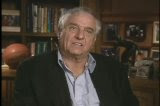Garry Marshall's Archive of American Television Interview Is Now Online
'70s/'80s hit-maker Garry Marshall's 6-part Archive interview is now available online. Click here to access the entire interview.
Excerpt: Marshall on the initial concept of "Fonzie" on Happy Days from Part 4
"We created this character Fonzie who was originally called Arthur Masharelli, but M*A*S*H was the name of a show so the nickname Mash wouldn’t work so Bob Brunner, who was one of the writers came up with the name, Fonzarelli. We needed something we could have short[ened]. And that was "Fonzarelli" and we put him in and I had done, see a lot of times people don’t understand, you try something here it doesn’t work; you try it again over here. I played a character in Blansky’s Beauties. I acted. I played a guy who worked in the casino in Vegas, never spoke. Just wore dark glasses and walked around scaring everybody. So I said let’s do that again. We get a guy who don’t talk. It’s always scary when a guy doesn’t talk. So Arthur Fonzarelli was really written just to point, to do gestures and say very little. And I always remember, one of my favorite actors was Gary Cooper, who said mostly "yup" and became a gigantic star, which amazed me. So I said, he’ll say little."
Interview description:
Marshall’s lively interview consists of many entertaining anecdotes about his over forty years in the television business. He describes his early years as a journalist and his eventual entry into comedy writing for The Tonight Show with Jack Paar. He talks about his work honing his craft as a writer on such ‘60s sitcoms as The Joey Bishop Show, The Dick Van Dyke Show, Love American Style (which served as a pilot for Happy Days) and The Lucy Show. He speaks in detail about developing The Odd Couple for television with his partner Jerry Belson. He then discusses helming some of the most popular sitcoms of the 1970s, including Happy Days, Laverne & Shirley, and Mork & Mindy. For these shows he details the casting, development, and production as well as discussed the impact these series had on ABC. Finally, he briefly talks about his entry into feature filmmaking. The interview was conducted by Karen Herman on August 28, 2000.

